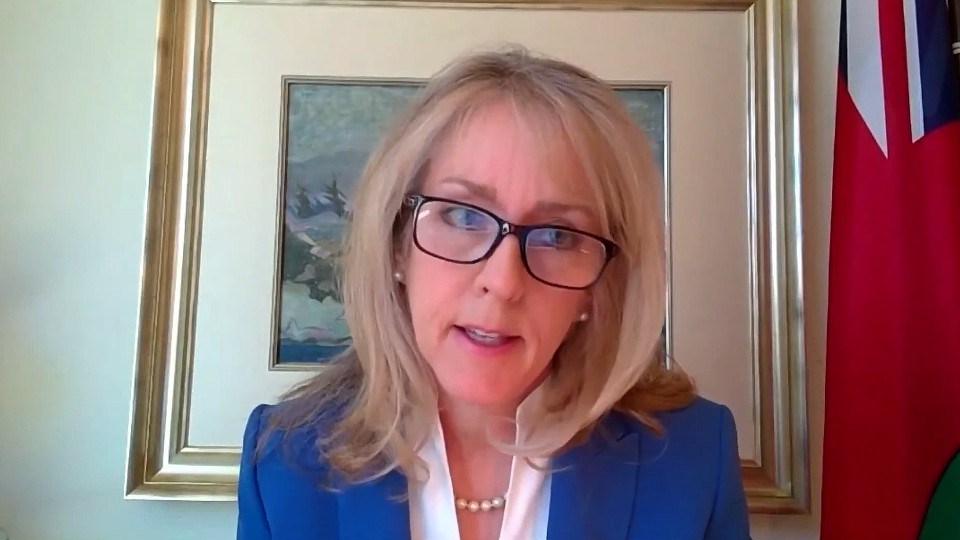The Ontario government announced a multi-million dollar investment in nursing education programs Friday, but the follow-up media conference seemed to be dominated by questions about concerns raised in the Ontario Long-Term Care COVID-19 Commission.
Ontario Long-Term Care Minister Merrilee Fullerton made the education funding announcement with supporting statements from Ontario Colleges and Universities Minister Ross Romano. She said the province is investing $35 million to increase enrollment in nursing programs in Ontario colleges and universities.
The new spaces will be available for fall 2021 and winter 2022 cohorts and it is expected this will bring approximately 1,130 new practical nurses and 870 registered nurses into the health care system.
Fullerton said the announcement would help address the gap between the current supply of nursing staff and the future needs anticipated for Ontario's health care system. She said the new funding is a significant step towards keeping pace with the rising demand for frontline health care workers during the COVID-19 pandemic, especially in sectors such as long-term care, home and community care, and acute care.
“Our government committed to ensuring residents in long-term care receive, on average, four hours of direct care per day. To make this a reality, tens of thousands of new staff need to be hired to provide this care — including registered nurses and practical nurses.” said Fullerton.
Following the formal announcement on a Zoom teleconference, Fullerton agreed to take questions from the media.
The minister was asked to account for her actions on April 17, 2020 when Fullerton had noted that military intervention was needed in Ontario long-term care (LTC) homes within 12 to 24 hours, but the intervention did not actually take place until several days later, on April 28.
Fullerton answered that the increasing loss of life was devastating in a number of LTC homes back then. She said LTC homes were being monitored daily and there was "a whole team of people assessing the homes in terms of their risk" and that staffing shortage was becoming more acute.
She said the teams consisted of labour ministry inspectors, public health staff, and long-term care ministry inspectors all monitoring what was going on. Fullerton said it required the ministries to move quickly, and they understood the need for urgency, but Fullerton said in some cases they "just couldn't move fast enough for COVID."
Moments later Fullerton said she wanted to clarify her statement to say that the decision to ask Canadian military medical professionals involved several ministries and government agencies.
"There was a multitude of people involved," said Fullerton.
Fullerton was also asked about the statements that indicated that residents died of "neglect," partly as the result of not being adequately fed or given enough fluids to drink.
On Page 150 of the Commission report, mention was made on the neglect issue:
"It was noted by ACCT [augmented civilian care team] that 26 residents died due to dehydration prior to the arrival of the CAF (Canadian Armed Forces) team due to the lack of staff to care for them. They died when all they needed was ‘water and a wipe down’," said the report.
"The ACCT Team reported that there had been resident deaths due to dehydration and malnourishment. The ACCT stated that in their time there, the LTCF management is non-existent and that they should be on-site daily, but are not. The ACCT did note that the condition of the residents has improved dramatically since the CAF Teams arrival."
Page 169 of the Commission report further outlined some of the comments of neglect:
"The Commission repeatedly heard that the inadequate numbers of staff had a direct impact on staff’s ability to practise effective IPAC (Infection Prevention and Control) and to meet the basic needs of residents, including hydration, nutrition, hygiene and human interaction. Apart from fatalities due to COVID-19, residents died as a result of neglect due to staff shortages.
"For example, the Commission was told that malnutrition and dehydration occurred due to a lack of available staff to tend to resident needs. As a result of these conditions, some residents spent their final hours in complete isolation and ultimately died alone."
Fullerton responded that her office was working to verify the statements.
"We are actively working right now with the coroner's office, understanding where that information came from and verifying what happened," said Fullerton. She said inspectors will be interviewing LTC home staff and medical directors and going over reports from the coroner's office to "verify what actually happened."
Fullerton added that all the deaths in the nursing homes had been devastating for all the families.
Fullerton was also asked to comment on statements attributed to Premier Doug Ford last year, when it became apparent how poor the conditions were in several Ontario LTC homes. Ford had remarked that the government was investigating the situation and that criminal charges could follow. But criminal charges did not happen.
Fullerton said there were inspections and investigations done last spring and last summer. But she added all statements and suggestions relating to things that happened last year have to be verified, regardless of what was reported by the commission.
"We're trying to piece this together as to what really happened and verify information that was said to the Commissioners."
Fullerton added that if any charges are to come out of the Commission it would likely have to come from the office of the Ontario Coroner.
"It is up to the coroner's office to identify if there is evidence to call in the police," said Fullerton.
Len Gillis is a Local Journalism Initiative reporter at Sudbury.com. He covers health care in Northern Ontario.
